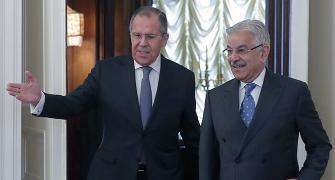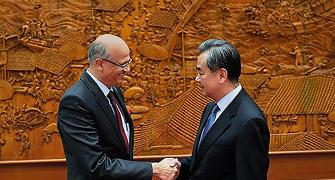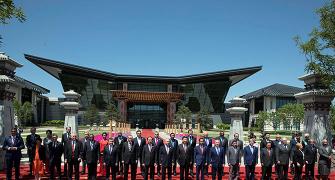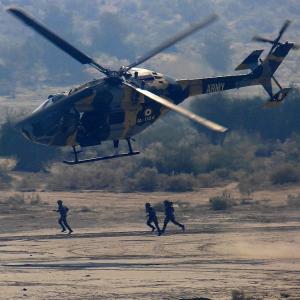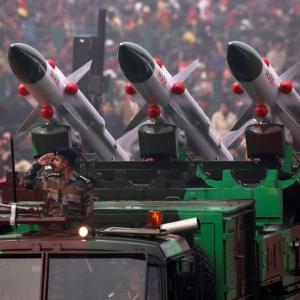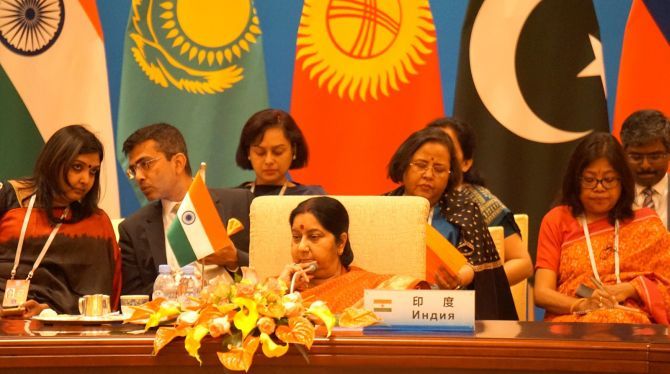
In a veiled attack on Pakistan, India on Tuesday asserted that arguments of 'political convenience' to provide an alibi for terrorist organisations are no longer tolerable and the international community should identify states that provide 'sanctuary' to terror groups.
External Affairs Minister Sushma Swaraj and Defence Minister Nirmala Sitharaman, addressing separate meetings of the Shanghai Cooperation Organisation in Beijing underlined India's strong opposition to cross-border terrorism and the urgent need to build a strong security architecture to combat the threat posed by it.
India also did not endorse China's controversial Belt and Road Initiative at the SCO Foreign Ministers' meeting while the rest of the eight-member bloc backed the pet project of President Xi Jinping.
In her address at the SCO Council of Foreign Ministers' meeting, also attended by Pakistan Foreign Minister Khawaja Asif, Swaraj raised the issue of global terrorism.
There are a number of challenges that are being faced by the world today, foremost being the threat of global terrorism and the imminent need to build a strong security architecture to combat it, she said.
"Terrorism is an enemy of the basic human rights: of life, peace and prosperity," Swaraj said.
The criminal terrorist militias are not impeded by borders as they seek to destroy the architecture of international stability and build walls of fear in societies that believe in pluralism, she said.
"We strongly believe that our fight against terrorism should not only seek to eliminate terrorists but should also identify and take strong measures against states that encourage, support and finance terrorism and provide sanctuary to terrorists and terror groups," Swaraj said without mentioning any country.
Addressing the SCO Defence Ministers' meeting, Sitharaman raised the issue of cross-border terrorism and said the world has now realised that there are no good terrorists.
"Arguments of political convenience to provide an alibi for terrorist organisations that support terrorism through material support or otherwise are no longer tolerable. Indeed, as the world has now realised, there are no good terrorists," she said, in the presence of Pakistan Defence Minister Khurram Dastgir Khan.
India and Afghanistan blame Pakistan for providing safe havens to terror groups such as Lashkar-e-Tayiba, Jaish-e-Mohammad, the Taliban and the Haqqani Network.
The Haqqani network has carried out a number of kidnapping and attacks against the United States' interests in Afghanistan. The group is also blamed for several deadly attacks against Indian interests in Afghanistan, including the 2008 bombing of the Indian mission in Kabul that killed 58 people.
"We must adopt an uncompromising approach towards the persisting threat of terrorism in Afghanistan. India is committed to assist Afghanistan in regaining stability, including cooperation in building capabilities of Afghan security forces," the defence minister said.
Swaraj said maiming and killing innocent lives indiscriminately, constitutes the most blatant violation of human rights.
"We have to work together to wipe-out this scourge from the face of the earth. In order to realise this objective, we must unite across our differences, strengthen our resolve and script an effective strategy against terror. We welcome the clarity shown by the SCO on terrorism from its inception.
"We should also urgently resolve to establish Comprehensive Convention on International Terrorism that India proposed more than two decades ago in the United Nations. We are determined to consistently strengthen cooperation within the SCO framework for comprehensive, cooperative and sustainable security," Swaraj told the SCO foreign ministers.
The SCO, headquartered in Beijing, was founded in 2001.
Comprising China, Russia, Kazakhstan, Uzbekistan, Tajikistan, Kyrgyzstan, India and Pakistan, the SCO aims at military cooperation between the member states and involves intelligence sharing, counter-terrorism operations in Central Asia and joint work against cyber terrorism.
India and Pakistan were admitted last year into the organisation in which China plays an influential role.
No support to Belt and Road Initiative
'The foreign ministers of Kazakhstan, Kyrgyzstan, Pakistan, Russia, Tajikistan and Uzbekistan reiterated their support for the 'Belt and Road Initiative' proposed by China,' said a joint statement issued by SCO Foreign Ministers at the end of their one-day meeting on Tuesday.
India's name was conspicuously missing from the list of countries which endorsed the BRI in which China-Pakistan Economic Corridor is a part.
'The parties support the use of the potential of countries, international organisations and multilateral institutions in the region to establish a broad, open and mutually beneficial partnership in the SCO region,' the statement said.
Differences should not become disputes, Sitharaman tells Chinese defence minister
Differences should not lead to disputes in relations between India and China, Sitharaman told her Chinese counterpart General Wei Fenghe in the backdrop of the strain in ties between the two countries after the Doklam standoff.
Sitharaman's remarks came as she met Wei during which both sides reviewed defence ties between the two countries. This is Sitharaman's maiden visit to China post Doklam.
During the meeting, she congratulated Wei for his appointment as the defence minister last month. "You have been assigned a major responsibility," she said.
"This is my first visit to China after becoming defence minister. We view India-China relations as an important relationship in our foreign policy," she told Wei, regarded a close confidant of Chinese President Xi Jinping.
As two large developing countries engaged in their national modernisation, India-China relations transcend bilateral dimensions and will have bearings on regional and global context, she said.
"We are guided in our relations with China by the consensus reached between our leaders that at the time of global uncertainty, India-China relations could be a factor of stability and that we must not allow our differences to become disputes," she said.
Welcoming Sitharaman, Wei said that China attaches great importance to her visit.
"Your attendance at the meeting in China will further deepen our military relations and enhance the development of security cooperation of the SCO," Wei said.

